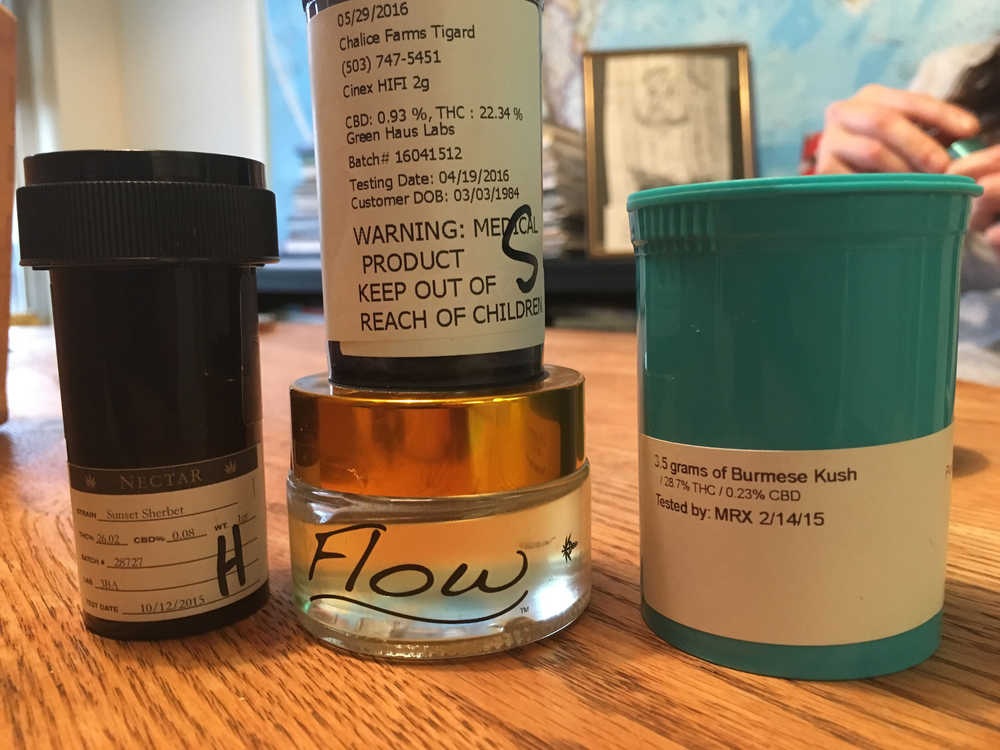You know wine. You’re about to learn cannabis.
Earlier this month, Rainforest Farms became Juneau’s first working cannabis farm. Among its 240-some plants are 55 different varieties of pot. Two other Juneau farms have applied for licenses, and four other farms have started the licensing process, according to records kept by the Alaska Alcohol and Marijuana Control Office.
By the end of October, when retail sales are expected to begin, consumers will be confronted with dozens of different cannabis options. For connoisseurs, it promises to be a buffet of choice. For the rest of us, it’s cause for curiosity. Isn’t weed … well, weed?
Not at all, said Gionno Barrett, one of the two principal figures behind Rainforest Farms. Each strain is different, offering hints of flavors.
“The flavors make it a lot of fun,” he said.
“Right now, the No. 1 thing different strains give you … is choice,” explained John Nemeth, the lead figure behind Top Hat Cannabis, which is planning a farm on Industrial Avenue. “Each strain produces … a different type of mental effect or body effect. People are chasing strains right now to create different recreational effects and different medicinal effects.”
It might help to think of cannabis like wine, Juneau’s cannabis farmers say. Most wines fall into two categories: red and white. Most cannabis comes from two plant species: cannabis sativa, and cannabis indica.
“And then there’s a rosé, which is kind of a hybrid,” Nemeth said.
The same is true with cannabis. Many (if not most) cannabis strains are hybrids that incorporate aspects of both plants.
Where wine’s intoxicating effects come from alcohol, the intoxicating effects of cannabis can come from one or several cannabinoids, chemical compounds that affect the body in different ways.
One of these cannabinoids, abbreviated as THC, is most associated with cannabis and lends the plant much of its psychoactive effect. Another cannabinoid, abbreviated CBD, is believed to be the source of cannabis’s medicinal value and doesn’t have psychoactive effects.
Alaska regulations prohibit growers from making health claims with regard to their cannabis, but that isn’t stopping growers from developing strains intended for people who want help dealing with pain.
“My heart’s really been in the healing properties of this plant,” Barrett said.
Nemeth agreed.
“We’re not creating something that’s going to do damage to the body; we’re creating something that’s trying to heal the body,” he said.
There are more than 100 different cannabinoids, each labeled with an alphabet soup of abbreviations, and each is present in different concentrations in different strains. That matters to consumers because cannabinoids affect different people differently. While alcohol — and tobacco, for that matter — has the same effect on almost anyone who consumes it, a strain of cannabis may affect two people in different ways because of their different body chemistry.
Beyond cannabinoids, Juneau’s cannabis growers are promising different flavors as well.
Sommeliers like to talk about wines that have floral or wooden hints. These aromae come from terpenes, the same chemical compounds that give Christmas trees and oranges their scent. Terpenes are also common in the hops that give your beer its bitterness — and they’re found in cannabis, too.
“The terpene profile, the cannabinoid profile, that’s what’s important to us,” Barrett said.
That’s because terpenes have (until recently) been overshadowed by their intoxicating counterparts, the cannabinoids, and in particular THC.
Like a winemaker who pursues the most alcoholic flavors of wine at the expense of flavor, cannabis growers have, until recently, sought to intensify the amount of THC in an individual cannabis strain. That trend has reversed to some degree in recent years, Barrett said.
He’s doing his part at Rainforest Farms, going so far as to create his own soil for each individual cannabis plant at the farm.
“For the most part, we’re trying to create the flavors, the microbes that come from Alaska, that live in Alaska,” Gionno said.
Give the microbes different soil, different growing conditions, and they’ll give the farmer something different in return.
“That’s why everything tastes a little bit different,” he said.
• Contact reporter James Brooks at 523-2258 or james.k.brooks@juneauempire.com.

